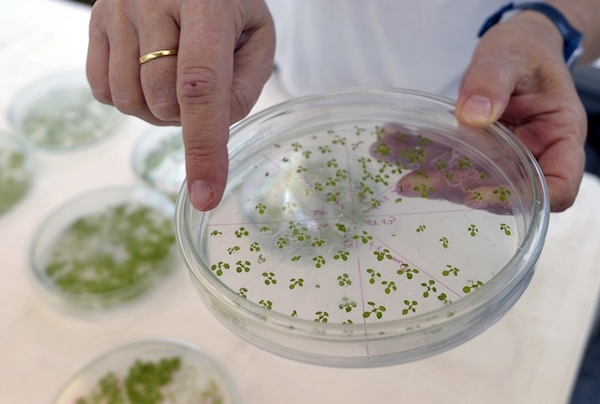Bravo to Owen Paterson for making such an extensive and detailed case for the value of genetically-modified crops today. That he gave this speech to Rothamsted Research at all is provocative, but if you read it in full, you will find a thoughtful and far more equivocal argument than the debate surrounding it suggests. The Environment Secretary did not, as some of his critics would have us believe, say that GM crops will solve all the world’s troubles and answer all the problems facing intensive farming. Instead, he said:
‘I believe that it’s time to start a more informed discussion about the potential of genetically modified crops. A discussion that enables GM to be considered in its proper overall context with a balanced understanding of the risks and benefits.
‘While I believe that there are significant economic, environmental and international development benefits to GM, I am conscious of the views of those who have concerns and who need reassurance on this matter. I recognise that we – government, industry, the scientific community and others – owe a duty to the British public to reassure them that GM is safe, proven and beneficial innovation. We must lead this discussion, explaining to the public not only what GM technology is but also how it can help.’
If only Ed Davey gave such considered speeches about the fears of those who disagree with him (more details on his latest offering here). Paterson quite gently reminded listeners not just of the innovations in agriculture that have already enabled more food to be produced without significantly more land being eaten up, but also of the potential of GM crops like golden rice for saving lives in the developing world. He also made the salient point that these ‘Frankenfoods’ can protect the environment, unlike many current intensive farming practices:
‘Used properly, the advanced plant-breeding technique of GM promises effective ways to protect or increase crop yields. It can also combat the damaging effects of unpredictable weather and disease on crops. It has the potential to reduce fertiliser and chemical use, improve the efficiency of agricultural production and reduce post-harvest losses.’
It is here that the environmental lobby struggles. Many GM crops are bred to reduce their susceptibility to diseases that wipe them out. That means farmers turn to fungicides and pesticides less frequently, thus reducing their footprint on the local ecosystem. If you are wedded to the virtues of organic food production then it is difficult to argue that GM is damaging, as it can facilitate those organic practices in intensive farming. Others argue that the GM crops sold to poor farmers will be sterile, thus leaving them at the mercy of large corporations such as Monsanto rather than saving their seed and re-sowing it each year. This may well be true, but it ignores the current reality: many commercially available crops today are F1 hybrids, created not in a lab but through breeding that renders them sterile too, or at the very least with seeds with a random and largely useless progeny. Farmers already have to buy their seeds every year if they want to grow crops for sale.
Some of GM’s critics want to see a return to open-pollinated varieties of vegetables. Some of those are still popular and prolific, but many of them are not suited to intensive farming or the demands of supermarkets. I grow many of them myself: white tomatoes and pumpkins shaped like zeppelins, but they aren’t designed to keep me alive. If my allotment has a bad year and crops fail, then I won’t starve or lose money, I’ll just be a bit grumpy. Professional growers do not have that luxury.
Other critics argue that GM may well be a good thing, but why promote it above dealing with the scandal of food waste? Around a third of food in this country is thrown way, they say, so do we really need these new crops when we could be making much better use of what we have? This is true, although when poor Richard Benyon tried to talk about food waste, he ended up being pilloried by Labour MPs who secretly agree with him. And the two issues work in tandem: to say that you should focus on one at the expense of the other is like taking out a gym membership while continuing to eat pizzas the size of dustbin lids every night. Besides, if a crop fails, that is food wasted.
GM won’t solve all of our food needs: things are more complex than that. But it isn’t a newfangled feature on Tomorrow’s World any more: the rest of the world is miles ahead of the European Union when it comes to these crops. This is another ‘global race’ issue. Paterson didn’t tell his audience today that the only way is GM. All he did was argue that politicians need to make the case to the public for the role of these crops in coping with a growing population on a small island. Good for him.







Comments